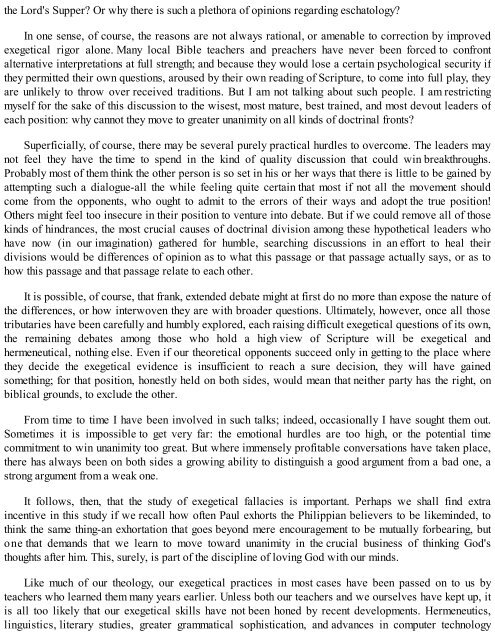Exegetical Fallacies - D. A. Carson
Exegetical Fallacies - D. A. Carson
Exegetical Fallacies - D. A. Carson
You also want an ePaper? Increase the reach of your titles
YUMPU automatically turns print PDFs into web optimized ePapers that Google loves.
the Lord's Supper? Or why there is such a plethora of opinions regarding eschatology?<br />
In one sense, of course, the reasons are not always rational, or amenable to correction by improved<br />
exegetical rigor alone. Many local Bible teachers and preachers have never been forced to confront<br />
alternative interpretations at full strength; and because they would lose a certain psychological security if<br />
they permitted their own questions, aroused by their own reading of Scripture, to come into full play, they<br />
are unlikely to throw over received traditions. But I am not talking about such people. I am restricting<br />
myself for the sake of this discussion to the wisest, most mature, best trained, and most devout leaders of<br />
each position: why cannot they move to greater unanimity on all kinds of doctrinal fronts?<br />
Superficially, of course, there may be several purely practical hurdles to overcome. The leaders may<br />
not feel they have the time to spend in the kind of quality discussion that could win breakthroughs.<br />
Probably most of them think the other person is so set in his or her ways that there is little to be gained by<br />
attempting such a dialogue-all the while feeling quite certain that most if not all the movement should<br />
come from the opponents, who ought to admit to the errors of their ways and adopt the true position!<br />
Others might feel too insecure in their position to venture into debate. But if we could remove all of those<br />
kinds of hindrances, the most crucial causes of doctrinal division among these hypothetical leaders who<br />
have now (in our imagination) gathered for humble, searching discussions in an effort to heal their<br />
divisions would be differences of opinion as to what this passage or that passage actually says, or as to<br />
how this passage and that passage relate to each other.<br />
It is possible, of course, that frank, extended debate might at first do no more than expose the nature of<br />
the differences, or how interwoven they are with broader questions. Ultimately, however, once all those<br />
tributaries have been carefully and humbly explored, each raising difficult exegetical questions of its own,<br />
the remaining debates among those who hold a high view of Scripture will be exegetical and<br />
hermeneutical, nothing else. Even if our theoretical opponents succeed only in getting to the place where<br />
they decide the exegetical evidence is insufficient to reach a sure decision, they will have gained<br />
something; for that position, honestly held on both sides, would mean that neither party has the right, on<br />
biblical grounds, to exclude the other.<br />
From time to time I have been involved in such talks; indeed, occasionally I have sought them out.<br />
Sometimes it is impossible to get very far: the emotional hurdles are too high, or the potential time<br />
commitment to win unanimity too great. But where immensely profitable conversations have taken place,<br />
there has always been on both sides a growing ability to distinguish a good argument from a bad one, a<br />
strong argument from a weak one.<br />
It follows, then, that the study of exegetical fallacies is important. Perhaps we shall find extra<br />
incentive in this study if we recall how often Paul exhorts the Philippian believers to be likeminded, to<br />
think the same thing-an exhortation that goes beyond mere encouragement to be mutually forbearing, but<br />
one that demands that we learn to move toward unanimity in the crucial business of thinking God's<br />
thoughts after him. This, surely, is part of the discipline of loving God with our minds.<br />
Like much of our theology, our exegetical practices in most cases have been passed on to us by<br />
teachers who learned them many years earlier. Unless both our teachers and we ourselves have kept up, it<br />
is all too likely that our exegetical skills have not been honed by recent developments. Hermeneutics,<br />
linguistics, literary studies, greater grammatical sophistication, and advances in computer technology



